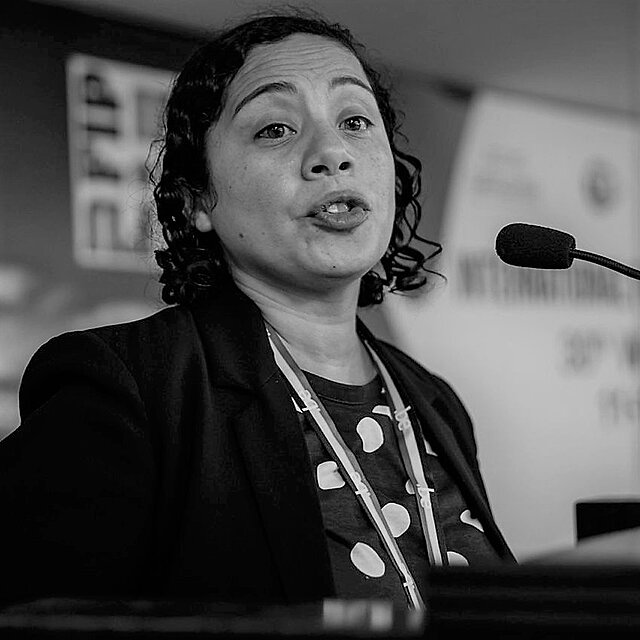"The bill under study focuses on the urgency of protecting the honor, dignity, good reputation and personal privacy of the individual and family, through our legal estates, sanctioning [persons] with an increase of the penalty for the misuse of the media, social media or websites that affect fundamental rights of the person protected by our legal order.”
With this language, Peruvian legislators seek to justify Bill 2862, already approved by a vote in Congress, which increases the penalty for people convicted of the crime of defamation to up to four years in prison. Nicknamed the "Gag Law" and pending another vote to be confirmed, the initiative has aroused fear and fury in the country's news environments. They perceive in the bill one more attempt, among many, to restrict freedom of expression and silence independent voices.
The first vote on the bill, on May 4, lasted only 11 minutes, without any previous debate or taking into consideration the positions of authorities and human rights organizations. At the time, the bill was approved with 69 votes in favor and 28 against.
The second vote on which the bill depends to become law was scheduled to take place last Thursday (May 18), but was postponed due to a strong reaction from civil society and parties that changed their position on the proposal. The president of the Congress, José Williams, stated that the decisive vote will take place this Thursday (May 25).
A successful lobbying effort by the journalist associations could mean that Congress ends up rejecting the initiative in the next vote. This does not mean, however, that the Peruvian press is out of harm’s way can breathe a sigh of relief. Since Thursday, several other bills have been presented with the potential to inhibit freedom of expression in Peru, adding up to nearly 100 such proposals since 2006.
In general, the attitude of the country's political class towards the press is one of attack. The offensive is part of a general environment of deteriorating democratic conditions, caused by acute political instability and a general mistrust of the population in the institutions.

Accordingo to Rodrigo Salazar Zimmermann, from the CPP, 'these kinds of bills to penalize defamation and increase prison sentences have come up in the last three or four years more or less once a year'
This means that, regardless of the outcome of the vote on the Gag Law bill this Thursday, Peruvian journalists are far from being able to breathe a sigh of relief.
“In Peru, these things never die,” Rodrigo Salazar Zimmermann, executive director of the Peruvian Press Council (CPP, by its Spanish acronym), an organization that represents the country's main media outlets, told LatAm Journalism Review (LJR). "These kinds of bills to penalize defamation and increase prison sentences have come up in the last three or four years more or less once a year. Even if this one is rejected, another one will come up eventually. Somehow, this [the rejection] may even motivate congressmen to propose more harmful bills."
Peru already has a law in place that punishes those guilty of defamation with up to three years in prison and a fine. The proposed change increases the punishment to up to four years and a fine.
According to a survey by El Comercio newspaper, between 2019 and 2022, at least 74 journalists and news outlets were reported or prosecuted after disseminating information about politicians, businessmen, religious organizations, public officials, and other people in positions of power. Charges of defamation, libel or slander appear in 37 lawsuits.
According to Zuliana Lainez, president of the National Association of Journalists (ANP) of Peru, the vast majority of those accused end up acquitted. This, however, does not mean that the accusations do not cause damage: In Peru, a lawsuit can run until it is time-barred for the maximum period corresponding to the time of the prison sentence added to half of it — that is, a duration equivalent to 150% of the maximum punishment time.
Under the current law, which provides for sentences of up to three years, cases can run for a maximum of four and a half years. If the new legislation is passed, prosecutions could last for up to six years.
"Most journalists are acquitted, but the punishment for them is the legal process, which is torture. If the process is longer, the judicial torture will be longer," Lainez told LJR. "For journalists in the regions [outside the capital Lima], it is untenable to stop for six years to organize a legal defense. Many face precarious conditions and end up with the public defender's office, which is also very precarious."

To Zuliana Lainez, 'most journalists are acquitted, but the punishment for them is the legal process, which is torture'
Head of the press freedom area at the Press and Society Institute (Ypis), Adriana León noted that journalists cannot leave the country while facing trial, and they usually have to spend money to defend themselves. She agrees that the very accusation of defamation already imposes a punishment. "The goal is not so much to put the journalist in jail, but to tire him out, to exhaust him," León told LJR.
The possibility of criminal punishment for crimes against honor in the criminal sphere goes against the determination of the Inter-American Commission on Human Rights, whose Special Rapporteur for Freedom of Expression stated that “the protection of honor in these cases must be given in civil courts, since a criminal sanction could inhibit monitoring the public function necessary in a democratic society.”
"This bill goes against all established Inter-American standards on honor. The Inter-American system has always emphasized that countries must safeguard the protection of honor in the civil sphere," Lainez said.
As in other countries, virtual campaigns of attack against public figures, often with trolls and bots, have become commonplace in Peru. In the Peruvian press, parliamentarians tried to argue that the law is not directed against actual journalists, but against those who promote defamation campaigns. "Sane and intelligent journalists don't have to be concerned about this issue," Jorge Montoya, of the conservative Popular Renewal party, told Infobae.
The law, however, does not provide any new provisions to curb disinformation, it covers everyone, and could easily be used against journalists.
“The way the law is set up, you will never know who is behind defamatory profiles on Twitter. I don't believe that this law fights defamation or virtual harassment. Rather, it is a law that clearly states that those who publish in news outlets or on social media will be punished," León said.
The Gag Law was proposed by Free Peru (PL), the leftist party that won the last elections with the candidacy of Pedro Castillo, imprisoned since December of last year after a failed coup attempt.
In addition to the PL, in the first vote the following parties gave their support: the Popular Action (AP), Alliance for Progress (APP), Magistral Bloc of National Coordination (BM-CN), Popular Renewal (RP), Democratic Change - Together for Peru (CD-JPP), Podemos Peru (PP), Bicentenary Peru (PB) and We are Peru (SP), which include acronyms from the extreme left to the extreme right.
Determined to stop the bill, the five main associations of journalists in Peru, which include everything from employers' unions to organizations closer to independent media, formed a broad front and began an intensive campaign of mobilization. One of the first initiatives was the Gag Law motto given to Bill 2862. “It was a very good idea to name it that. Undoubtedly, [the politicians] didn't like it very much. But the legal framework is already being used in the country to try to silence investigations.”
Last week, the advocacy front met with members of Congress from virtually every party on the first three business days of the week, while the vote was scheduled for Thursday. Journalists report having virtually heard admissions from the congressmen that they sought to intimidate the press.
"We tried to understand why this norm was the right one. Many of them told us that they voted in favor of these bills as a kind of payback or revenge against the work of journalists who investigate their misdeeds and investigate their corruption issues, who call them names or make them uncomfortable during interviews."
León, who also participated in the conversations, says that they made it clear that "many congressmen legislate without reading [the bill], and their votes are always motivated by their passions or their emotions." According to her, the persuasion work made it clear that a large part of the parliamentarians do not understand the social function of journalism.

The law 'clearly states that those who publish in news outlets or on social media will be punished', says Adrian León, from YPIS
They’d say, ‘'I voted for the law because I hate Juliana [Oxenford],' a journalist. 'I voted for it because I hate her, I didn't read the bill.' Or 'my advisors have told me that it is against journalists.' In other words, they have an erroneous vision of what the practice of journalism is," León said.
Despite difficulties, the persuasion was successful. Congressmen from the Popular Action, Alliance for Progress, and Bicentennial Peru caucuses withdrew their support, leaving the initiative without enough votes for approval. The president of the Justice Commission, Américo Gonza, of Free Peru, asked for a break to evaluate some of the observations and “if possible, improve this text.”
"They’ve seen that we are quite well organized. We have a pretty strong defense front and we have, let's say, quite a bit of access,” Salazar Zimmermann said. "Pedro Vaca, the rapporteur on Freedom of Expression for the IACHR, has said he has only seen such a united and strong front in defense of journalism in a handful of countries in the region. Undoubtedly, we have differences when it comes to some texts, but the reasons that unite us are stronger."
On Thursday, when and if it is voted on, the bill could meet a number of fates. It may simply be rejected, removing the danger for the time being. If it is approved with modifications, this makes the first vote invalid, and another one will be necessary. The text can also return to the Justice Committee, restarting its entire legislative process. "For us, the best thing would be to vote and reject it," Lainez said.
Even if this happens, however, the Peruvian press should continue to expect attacks from its political class. The offensive comes amid a series of corruption scandals, and a prolonged political crisis.
Since 2016, when Pedro Pablo Kuczynski was elected president and the opposition linked to former dictator Alberto Fujimori (1990-2000), who held the majority of Congress, did not accept the results, there have been seven attempts to impeach Peruvian presidents, and three of them were successful (against Kuczynski in 2017, Martín Vizcarra in November 2020 and Pedro Castillo in 2022).
The country has not been able to stabilize itself since the corruption scandals in the context of the so-called Odebrecht case started in 2017. Even before that, the traditional parties that dominated Peruvian politics during almost the entire 20th century lost strength due to the economic crisis of the state of exception during the fight against the Sendero Luminoso guerrillas and the Fujimori coup in 1992.
According to a survey by El Comercio, 25 of the 69 parliamentarians who supported the project in the first vote are facing investigations, partially based on cases first denounced in the press. The Gag Law itself was based on a case known as “mocha sueldo [kickback salary],” revealed by the investigative unit of the Latina broadcaster, in which parliamentarians were denounced for pocketing part of their employees' salaries.
"It all has to do with our politicians being involved in serious situations. In many cases, crimes of all kinds, and the press is there, looking,” León said. According to Zimmermann, “"Many of those who might vote against really wanted to vote in favor, but they don't do it because they are precisely in the spotlight and they don't want to look even worse before the citizenry."
This explains other ongoing bills that could threaten the Peruvian press. Faced with imminent defeat, Peru Libre is strengthening a campaign in favor of an initiative to impose national cultural content quotas on broadcasters and TV stations. At Renovación Popular, a congressman presented an initiative that requires those who seek to practice journalism to have a professional diploma.
This offensive against the press is happening in the midst of other threats to the press, such as police violence against journalists during protests and the intensification of attacks by extreme right groups linked to Fujimorismo against journalists and the media.
At the same time, there is also a weakening of other instances of monitoring of power, such as the decrease in the autonomy of the Constitutional Court in relation to Congress and the choice of a People’s Defender — responsible for upholding human and constitutional rights — with political ties, who lacks a track record in this area and has been denounced for conflict of interest.
"The bills and initiatives against journalists cannot be seen outside the general context of Peruvian politics. Peru is following a ceaseless path towards becoming an autocracy. Peru is giving up every week from being a democracy to becoming something like El Salvador or Guatemala," Zimmermann said.
According to León, "Since the political crisis, things are happening that have not happened before in Peru. I believe that there is a very active journalism in Peru, which is watching, which is monitoring, and this is something that drives politicians mad in Peru. Because everyone has, as we say here, a straw tail [a guilty conscience]. Everyone has something to hide.”